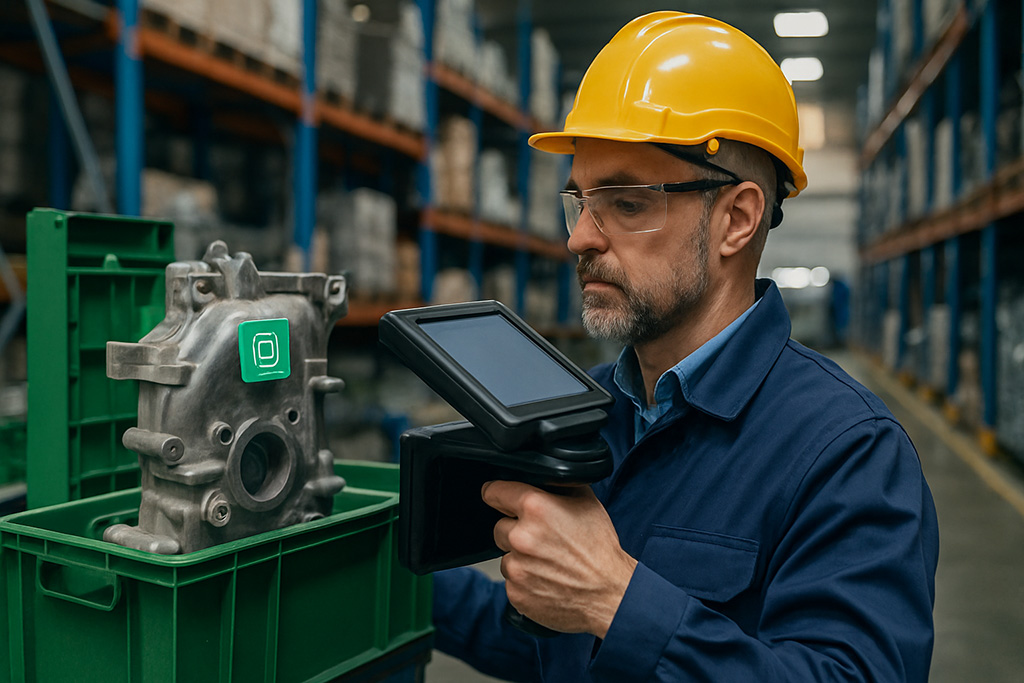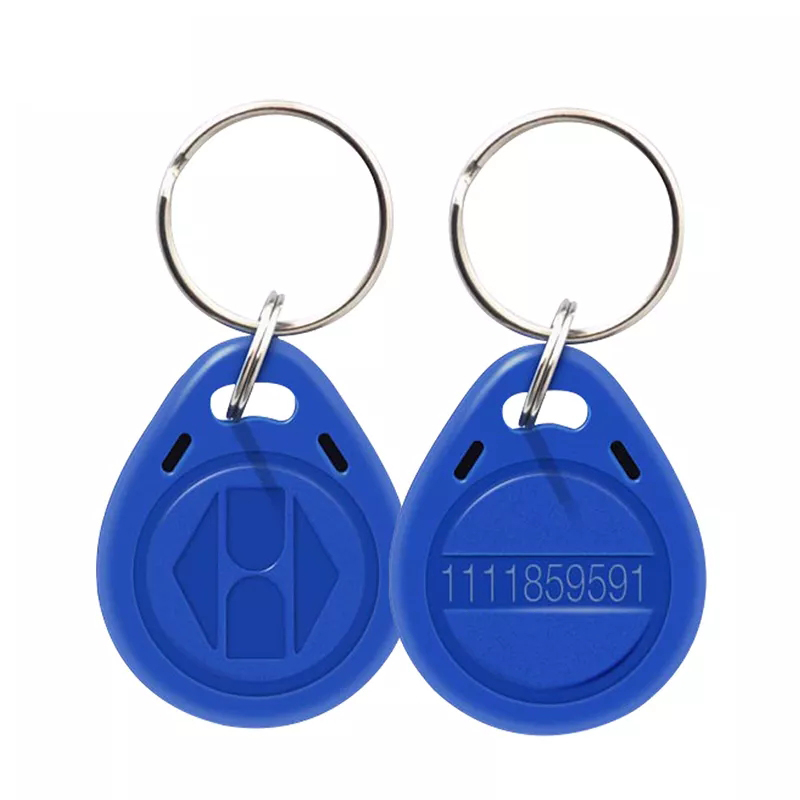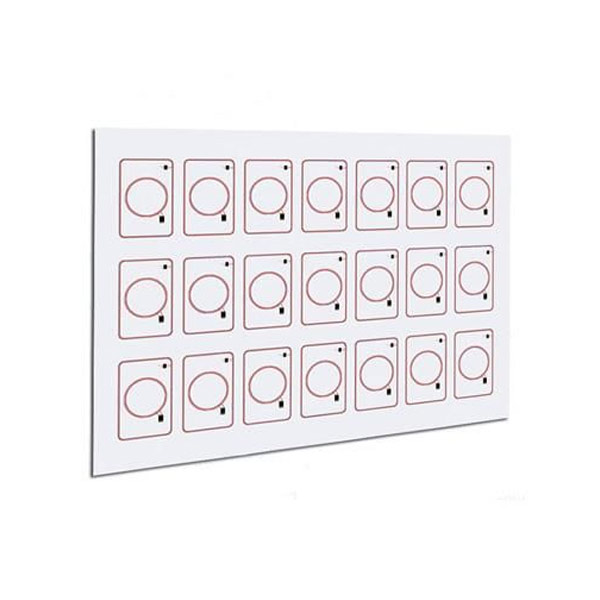
The manufacturing industry is undergoing a profound transformation. The rise of Industry 4.0 and Industrial IoT (IIoT) has shifted factories from traditional production lines to fully connected, data-driven ecosystems. In this new era, speed, accuracy, and real-time visibility are no longer competitive advantages—they are fundamental requirements for survival.
One of the technologies at the heart of this transformation is RFID (Radio Frequency Identification). By enabling automatic identification and real-time tracking of materials, components, and finished goods, RFID is helping manufacturers eliminate bottlenecks, reduce errors, and unlock unprecedented levels of efficiency.
In this article, we will explore how RFID works, its role in the Smart Factory ecosystem, its benefits, real-world applications, and how our RFID solutions can help your manufacturing operations achieve operational excellence.
Understanding RFID Technology in the Context of Smart Manufacturing
RFID is a wireless technology that uses electromagnetic fields to automatically identify and track tags attached to objects. These tags contain electronically stored information, which can be read without direct contact or a clear line of sight—a major advantage over traditional barcodes.
Core Components of an RFID System
RFID Tags – Small devices embedded with a microchip and an antenna. They store unique identification data.
Passive RFID tags: Powered by the RFID reader’s signal, ideal for low-cost, high-volume use.
Active RFID tags: Battery-powered, capable of longer read ranges and continuous signal broadcasting.
UHF (Ultra-High Frequency) tags: Widely used in industrial environments for long-range, high-speed scanning.
RFID Readers – Devices that emit radio waves and receive signals back from the tags. Industrial RFID readers are designed to withstand harsh environments.
Antennas – Facilitate communication between tags and readers, determining read range and accuracy.
RFID Middleware and Software – Integrates RFID data into MES (Manufacturing Execution Systems), ERP (Enterprise Resource Planning), or warehouse management systems, enabling analytics and decision-making.
How RFID Works
When an RFID tag enters the electromagnetic field generated by a reader, it transmits its stored data wirelessly. This information is then processed by the software system to update inventory counts, track item location, or trigger automated workflows.
RFID vs. Barcodes
While barcodes require manual scanning and line-of-sight, RFID can read multiple tags simultaneously from several meters away. This makes RFID particularly suited for high-speed production environments and real-time logistics.
In a fully connected Smart Factory, RFID acts as the bridge between the physical flow of goods and the digital flow of data.
Integration with IoT Sensors – RFID tags can be combined with temperature, vibration, or humidity sensors for condition monitoring.
Collaboration with Robotics and AGVs – Automated Guided Vehicles (AGVs) and robotic arms use RFID data for navigation, pick-and-place tasks, and automated replenishment.
Support for Digital Twin Technology – RFID provides accurate, real-time asset location data that feeds into a digital twin, allowing manufacturers to simulate, analyze, and optimize production scenarios.
RFID enables automatic identification of raw materials as they enter the facility, tracking work-in-progress (WIP) items through every stage of the assembly line, and ensuring finished goods are accurately recorded before shipping.
1. Real-Time Visibility
RFID allows production managers to see exactly where each component is at any given time, across multiple production lines or storage areas. This eliminates the guesswork and delays often associated with manual data entry and periodic inventory checks.
2. Enhanced Accuracy
With near-100% read accuracy in optimized environments, RFID reduces human error in inventory counts, order fulfillment, and quality inspections. This ensures that every product, component, or shipment is tracked with precision throughout the manufacturing process.
3. Reduced Labor Costs
By automating the identification and tracking process, manufacturers can significantly reduce the manpower required for manual scanning and verification. This frees employees for higher-value tasks such as process improvement, system monitoring, and quality analysis.
4. Improved Supply Chain Transparency
RFID enables seamless tracking from suppliers to customers, offering greater traceability and ensuring compliance with industry regulations. This enhanced visibility allows faster response to disruptions, recalls, or urgent production changes when necessary.
5. Scalability and Flexibility
RFID systems can easily scale to accommodate new production lines, additional facilities, or increased throughput without major infrastructure changes. This makes them a future-proof investment capable of evolving with changing manufacturing demands.
6. Actionable Data Analytics
By integrating RFID with analytics platforms, manufacturers can identify production bottlenecks, predict maintenance needs, and improve operational planning. The resulting insights help optimize resources, boost productivity, and drive continuous process improvement.
Real-World Applications of RFID in Smart Manufacturing
The practical applications of RFID in manufacturing are extensive and varied. For work-in-progress (WIP) tracking, tags can be attached to components at the earliest stages of production, enabling every movement and process step to be recorded automatically. This ensures that no part is misplaced or overlooked, and that each product follows the correct assembly sequence, thereby reducing rework and scrap rates.
In asset management, RFID tags affixed to tools, fixtures, and mobile equipment help prevent loss and improve utilization rates. Maintenance teams can quickly locate the specific equipment they need, while management can monitor usage patterns to schedule preventive servicing more effectively.
Material flow optimization is another area where RFID delivers value. By integrating with warehouse management systems and conveyor control software, RFID-enabled storage areas can automatically direct materials to the appropriate location, reducing manual handling and minimizing misplacements.
When it comes to finished goods tracking, RFID ensures that products leaving the production line are properly recorded, packaged, and routed to the correct customer or distribution center. This level of control supports supply chain transparency and makes it easier to comply with industry regulations that require detailed product traceability.
Even quality control processes benefit from RFID integration. At designated inspection points, RFID readers can automatically verify product identities and retrieve relevant inspection criteria from a central database, triggering either approval or a rework order without manual intervention.
Challenges and Considerations for RFID Implementation
Despite its benefits, RFID is not without challenges:
Signal Interference – Metal surfaces and liquids can cause signal degradation. Specialized tags and reader configurations are required.
Implementation Costs – Initial investment can be significant, though ROI is often realized within months due to labor savings and improved efficiency.
System Integration – RFID must work seamlessly with existing MES, ERP, and WMS systems.
Data Security – Protecting RFID data against unauthorized access is critical in a connected Factory.
Environmental Conditions – Extreme temperatures, chemical exposure, and high mechanical stress require rugged RFID tags.
How Our RFID Solutions Address These Needs
Our company provides comprehensive RFID solutions tailored to the unique demands of Smart manufacturing environments. Our high-performance RFID readers are engineered for industrial reliability, capable of maintaining accuracy even in electromagnetically noisy conditions. We offer durable RFID tags designed to withstand metal interference, liquid exposure, and extreme temperatures, ensuring consistent performance in challenging settings.
Our custom RFID software facilitates seamless integration with existing enterprise platforms, allowing real-time updates to ERP and MES systems without manual data entry. Moreover, our real-time analytics dashboard transforms raw RFID data into meaningful operational insights, enabling managers to identify inefficiencies, forecast maintenance needs, and optimize resource allocation.
In one recent deployment for a global automotive manufacturer, our RFID system was implemented to track WIP components across multiple production stages. Within just six months, the client reported a 28% reduction in production delays, an improvement in order fulfillment accuracy to 99.8%, and significant labor cost savings through the automation of previously manual tracking tasks.
Conclusion
As manufacturing continues its transition toward fully connected, data-driven ecosystems, RFID stands out as a critical enabler of operational excellence. By delivering automatic identification and real-time tracking, RFID eliminates the inefficiencies inherent in manual processes, enhances accuracy across the production lifecycle, and provides the data foundation for predictive, adaptive decision-making.
For manufacturers aiming to remain competitive in the Industry 4.0 era, the question is no longer whether to adopt RFID, but how to integrate it effectively and maximize its value. Our industrial-grade RFID solutions are designed to meet this challenge head-on, combining robust hardware, intelligent software, and deep industry expertise to deliver measurable results in even the most demanding environments.
If you are ready to enhance visibility, reduce costs, and accelerate your path toward a truly Smart Factory, we invite you to contact our team to arrange a consultation and explore the possibilities of RFID-driven transformation.





